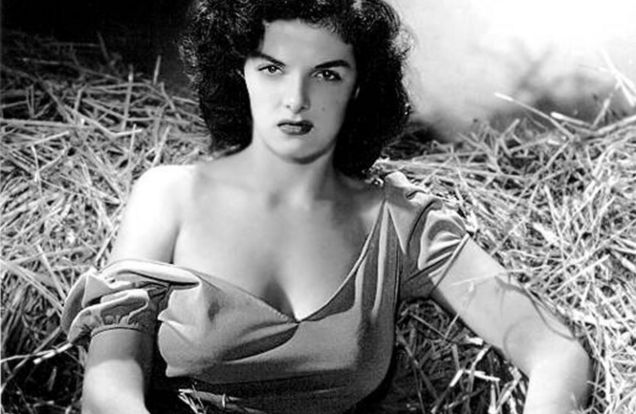BOMBSHELLS AND DOLLIES
The Present-Day Pin-Ups of Miss Viva Las Vegas
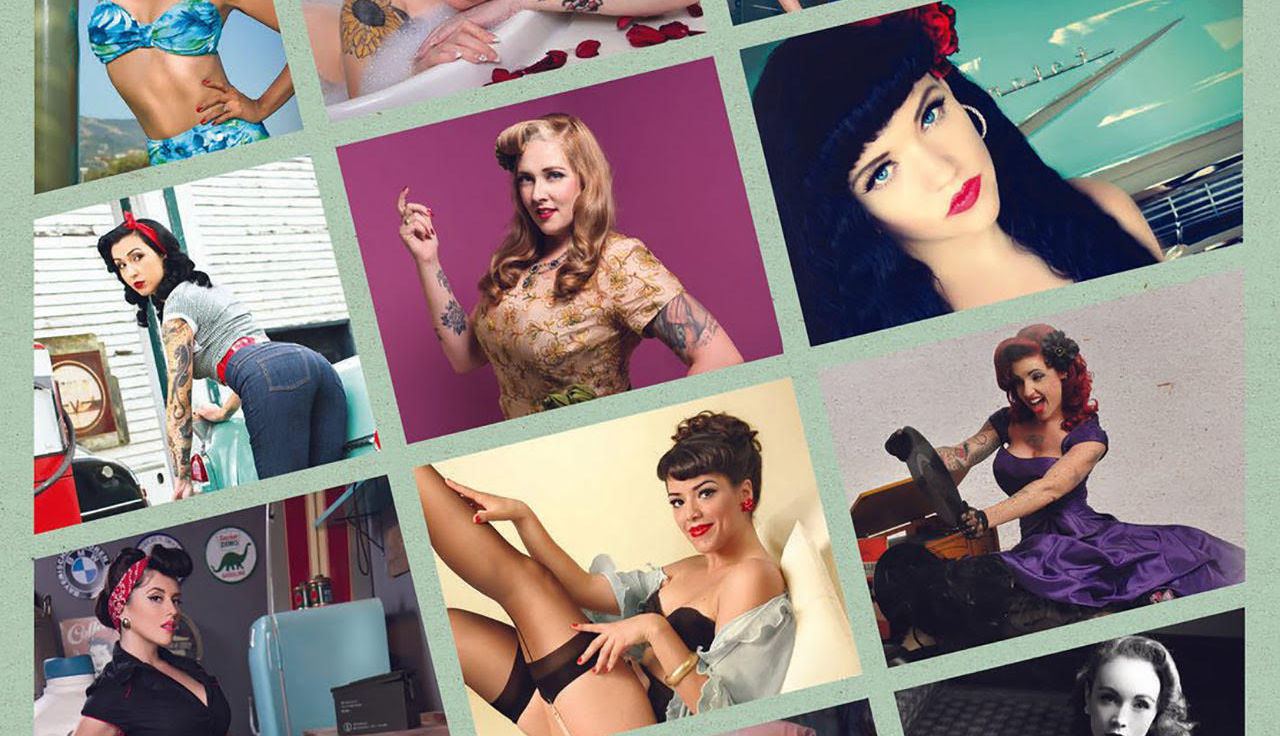
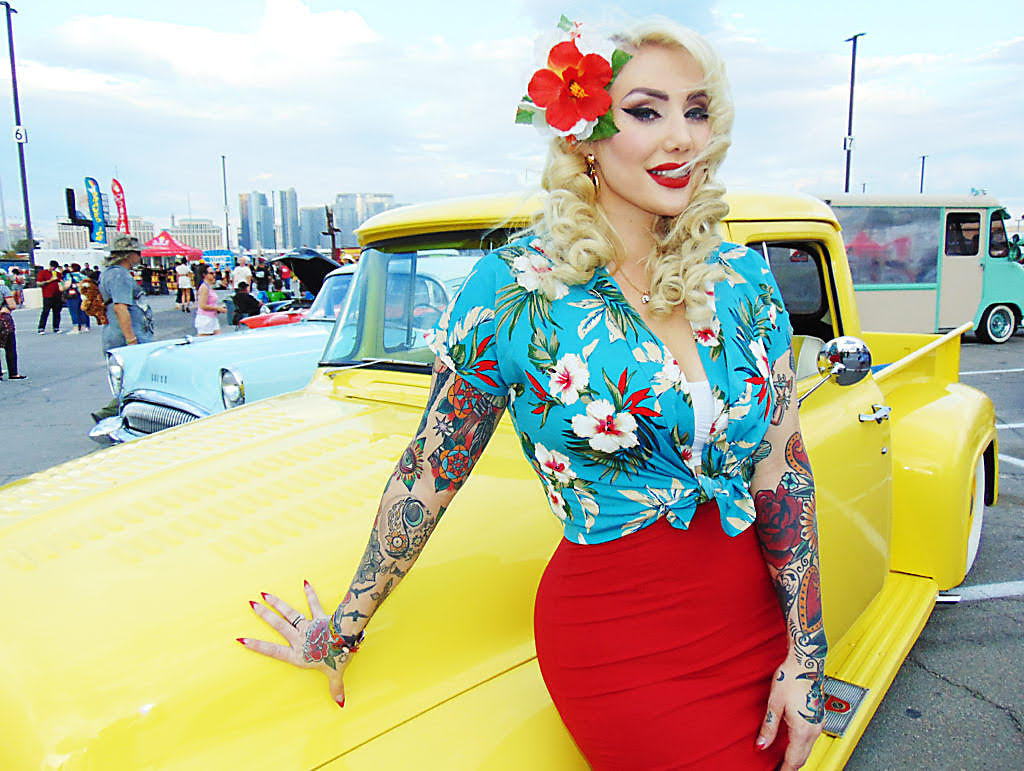
What comes to mind when you hear the term pin-up? You probably think of the posters of suggestively-posed women popular among soldiers during World War II, or of Bettie Page in the 1950s. Images of pin-up girls date even further back to the 1890s though. Even today, there are communities of people dedicated to the world of Rockabilly, and that includes modern-day pin-up girls. TriCoast Entertainment’s new documentary, Bombshells and Dollies, follows a group of modern-day pin-up girls as they vie for the title of Miss Viva Las Vegas 2018.
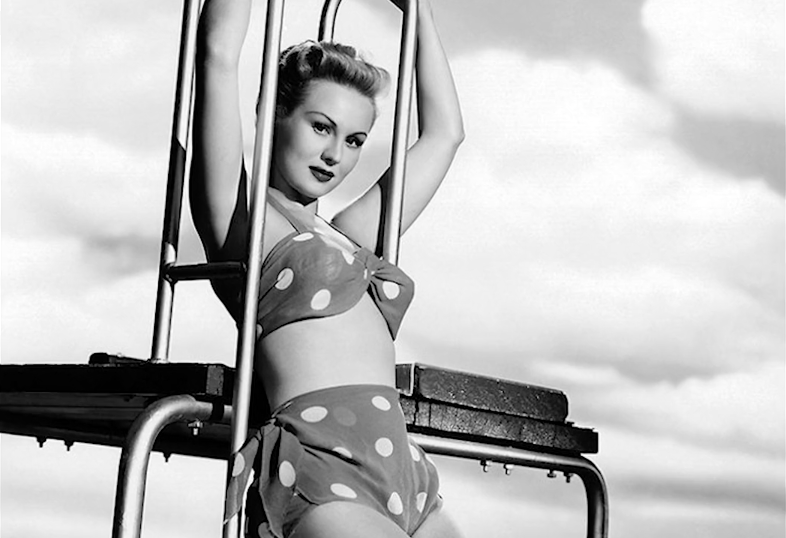
Miss Viva Las Vegas is an annual competition that takes place during the Viva Las Vegas Rockabilly weekend. The competition was founded by professional pin-up Rockwell De’vil. At Miss Viva Las Vegas, 12 women from anywhere in the world compete to be crowned the best pin-up. Unlike other beauty competitions, the women of Miss Viva Las Vegas tend to be adult women with established careers who have found pin-up as a creative and emotional outlet. They see it as a way to control their sexuality, be feminine, but also be smart and powerful.
The documentary delves into how a lot of women came to pin-up, explaining that it often attracts women who have gone through trauma or feel that they don’t belong in the modern mold of what is attractive. It also appeals to a large amount of LGBTQ+ individuals who see pin-up, and Rockabilly as a whole, as a safe space.
PROVOKR recently got the chance to speak with the film’s director Dan Halperin, producer/cinematographer Marie Ilene, composer Cliff Retallick, and founder of the Miss Viva Las Vegas competition, Rockwell De’vil. These were conducted as separate interviews, but combined here and edited for length and clarity.
How did you first learn of the Miss Viva Las Vegas competition?
Dan Halperin: So I found myself at Viva Las Vegas Rockabilly weekend with Dane Krogman, who is the other producer on this film, and we were researching another project. And, that project fell through. And just in the process of being at Viva for a couple of years, doing this research about this other project, we recognized these amazing women. And I thought that’s a fascinating subculture. And I will say that I was extremely judgemental, because once I realized what they go through to do what they do, as a dude, you know I put on a pair of pants and a shirt and I’m out the door. The fact that these women take three hours to prepare themselves, and they do that twice a day, and have multiple outfits to wear during the day, just seemed very odd to me. I at first came at it as a concept for an unscripted show. And I did take that out to some buyers and some networks and they said, oh, this is really fascinating, we can script some things and we can get the women to fight, cause that’s what a lot of the unscripted shows are like. So I took it to these women, and I was introduced to Rockwell De’vil cause she created the contest and she said forget about it, we would never do that. So that was kind of the genesis of going down this path. The additional thing is that Dane [Krogman] is a professor at the University of North Carolina School for the Arts, and he said you know I can get some of my former students who are out in LA. And he introduced me to a cinematographer and also a composer. The cinematographer turned out to be Marie. And also the composer is Marie’s husband, Cliff. So it just became this journey of me getting adopted by Cliff and Marie. Cause they know stuff. So, what might be kind of special about me relative to this project is I came into it knowing nothing. It was all a path of discovery. And I had to go to Marie, kind of constantly, to find out what was appropriate or understanding just what the nomenclature was. She was able to liaise, with not only the women but also the community. So that’s how I got into it. Oh, just so you know, one last thing is that I am co-chair of diversity inclusion at the Producers Guild of America, and a number of my projects have to do with positive things and then some of them are more commercial. And this initiated as something I felt like was a commercial thing and then it evolved in being sort of a project dealing with issues of diversity and inclusion
Cliff Retallick: Well you know [Dan] was headlong into this project and we kind of knew that scene. And when Marie started working with him, it was just really fortuitous that she knew so much about it. Then she took me into it because I wound up going along the ride before I even scored it.
Rockwell, what made you create the Miss Viva Las Vegas competition?
Rockwell De’vil: Years ago I had entered a contest and the producer of the show made me so uncomfortable and made it clear that ultimately he decided the winner of the contest. There were so many red flags and after he made a few comments I realized this was not legitimate and regardless of what the audience thought, I was not going home with any wins unless I was willing to compromise who I was for something so superficial.
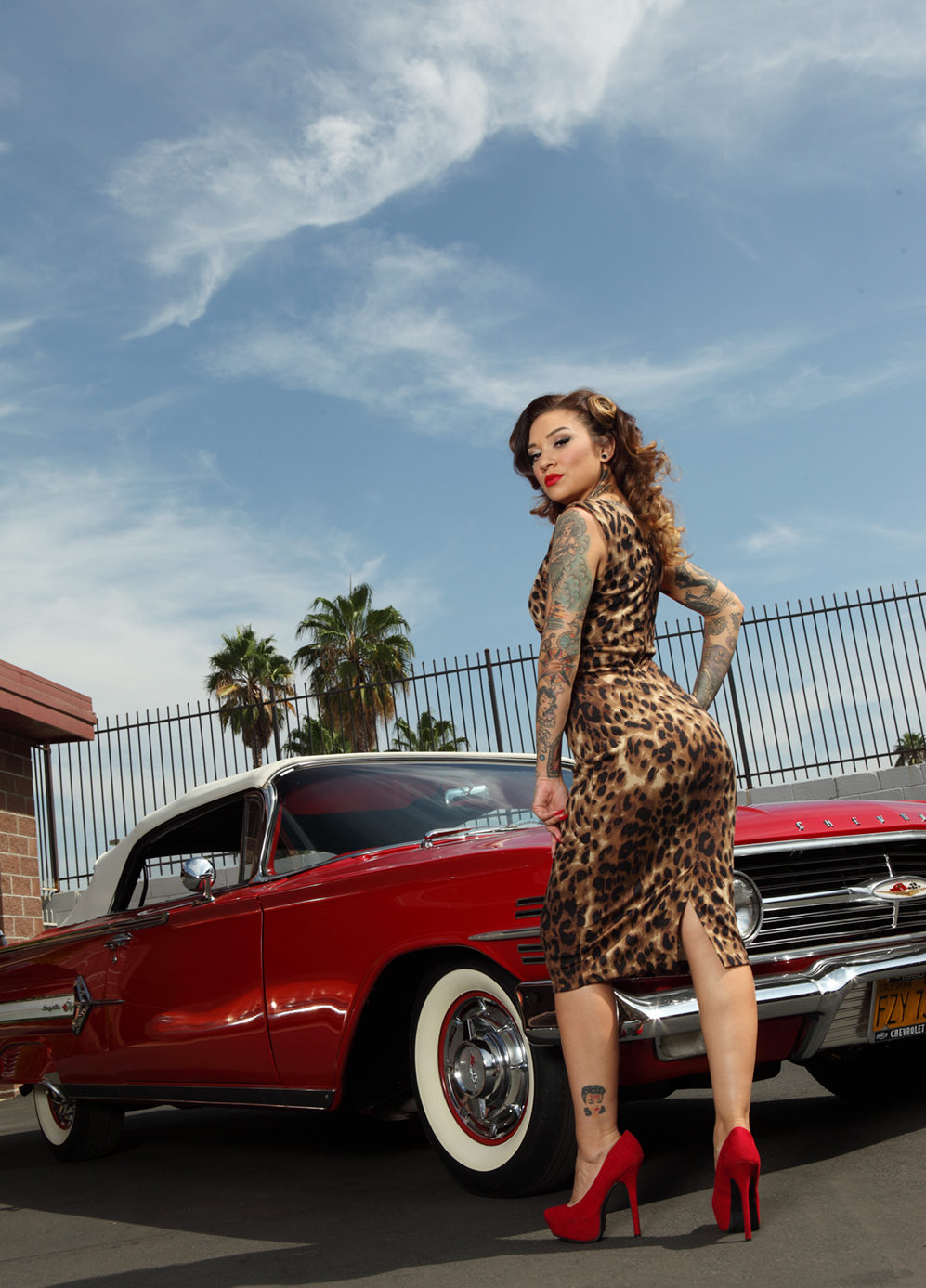
How did you come to the pin-up scene and what have your experiences been with it?
Rockwell De’vil: I came into the scene nearly 20+ years ago. It was so different then. In the beginning there were some growing pains as there were some serious what we like to call, “Vintage Enthusiasts” and if you weren’t in vintage then you got the cold shoulder. That’s putting it nicely. Overtime, that sort of attitude was adjusted, and it became a bit more flexible. Recently, there has been a shift that has taken away from the culture and I believe that has a lot to do with the shift in Social Media and what it has done to the psyche of people. So many are completely disconnected from one another and have sort of been too concerned with their “likes” and “followers” and I am hoping that soon dies down so we can get back to enjoying one another and our love for the scene.
So now Marie, how did you get involved and what have your experiences in the community been?
Marie Ilene: I was a recovering goth. I was very alternative in high school. And there’s a lot of us. There’s a lot of pin-up girls who kind of came from that because you know, we just didn’t fit the mold. We were looking for something different. And when I started dating my husband, he noticed that everything I wore was black and kind of dreary. And he wanted me to introduce some color into my wardrobe. And he knew my body really well, he knew I had trouble getting things to fit. And he’s very into the Rockabilly culture because he’s a guitar player, piano player. And I don’t know where he got the idea, but yeah, my husband bought me a bright red, pin-up dress from Tatyana’s. He knew I would wear red. And it was like an awakening for me. I was like, this dress fits me. It fits my curves, I feel good in it, I look good in it. Now I want to put on makeup, now I want to style my hair. I want to come up to the level of this dress. That one dress put me over, because I’d never really been able to buy a dress that fit my curves.
Cliff Retallick: Yeah, it seemed to set her off. She had been in the punk rock world, and done a lot of that. It seems like there are a lot of women who follow that trajectory. Rockabilly seems to just have an edge that those women really like.
And Cliff, how did you get into it?
Cliff Retallick: When I was a little kid I was introduced to Elvis and it was instantly kind of my favorite music. When I got older I gained more of an appreciation for a lot of different Rockabilly people like Johnny Cash, Jerry Lee Lewis as a piano player. I just love all this stuff, have all my life. You know my parents came from that generation so I heard all that music growing up.
And you play a few different instruments?
Cliff Retallick: Yeah, I try. I play piano. I’m primarily a piano player, but I play guitar too.

Let’s talk about the music for the film. So you said you were there while they were filming before you even scored it. So what was your whole process for this?
Cliff Retallick: Well, you know, documentaries take a long time and they’re a lot more complicated than people think they are. You know, composers come on when the picture’s already cut. We come in and we put the music all over it. This one wasn’t like that because we did several pre-trailers to it. So I started cutting music before the film was ever made. Then when it was locked, I brought in some heavy hitter friends who are really fantastic players. It’s wall-to-wall music and it all had to sound like something familiar yet original. That’s not easy to do. To make it sound that way, it was a real challenge. Probably as fun a score as I’ve ever put together because it just lent itself to so many things I love to do. And I got to bring in some great players like Marco Palos on the saxophone. He’s always at Viva, he’s the Viva house band guy. And I had a great day with him and we just blew it out. But wow, was it a lot of work, probably the most work I’ve ever put into a score. And it sounds pretty effortless. Music puts a context to everything that you see. If you watch some reality tv shows you realize that there’s never a moment that music’s not telling you how to feel. Not exactly the goal with Bombshells and Dollies, what we really wanted was it to bob along with the flow of the movie. When you’re at Viva Las Vegas, there’s never a moment when you’re not hearing music. And it kind of had to feel that way. The whole flow of it, just needed music the whole time.
In the movie, there’s a lot of talk of how women come to it because they’ve gone through, not only feelings of not fitting in, but also traumatic experiences. Why do you think that is?
Rockwell De’vil: It gives them a place where they belong. The aesthetics are timeless and that is something that has never or could never go out of style. We looked up to our elders and they grew up in a time where women were expected to be “presentable”. Today, in our go go go world, we don’t always have that luxury. Pinup is almost a great excuse to dress up without someone looking at you like you are going to a costume party. (Believe me, I was asked that more times than I could count in my 20s.) Today, the fashion and culture are more mainstream. We all go through trauma. It’s inevitable. We all can relate to those hardships in one way or another. There is just something about getting dressed up, your hair done, a little makeup on that makes us feel good. Confident.
Ready. It’s self-care and this sort of timeless classic look is gorgeous on everyone.
Marie Ilene: I think, like any kind of subculture, when you find a place where you belong, it feels really good. Like it’s really amazing, when I go to Viva, and other events, I can walk in there and just know that I’m gonna see people I know. And it’s a compliment fest, because I love their dress and they love my hair. And we’re all trading tips. And that happens online too. I mean I’m friends with people in Australia that I’ll never meet, but we’re trading tips on hair or how to get better winged eyeliner. And so I think, yeah, if you’ve had a traumatic experience, finding a community that’s a lot of women and they’re just really loving. And it’s hard to find a group of women who are always complimenting each other and not competing with each other. At these pin-up contests, you see everyone’s hugging at the end. No one hates the winner, everyone’s congratulating her and telling her she deserved to win. It’s full of love. And I know a lot of other counterculture communities are like that as well, but this is the one I’m in and that’s how I feel.
Dan Halperin: Again, you know this is all educational for me, so I knew nothing. And we [had] these 12 contestants, and it became fascinating because in the process of putting the film together, it kind of came together that there were like 12 themes to follow along in the movie. So it’s kind of a magical gift from the documentary gods that we had a couple of body positivity advocates, we had a Latina who was ostracized and dealt with bullying because of her dark complexion, and we had an LGBT woman. And we had women from Brazil. So I just found it fascinating that there was this level of diversity and reasons that people came into the culture. And they were able to find a home there for all these different reasons. And so many of the reasons were very touching. You know, “people judged me in these other cultures, I don’t feel judged here”. Other people [it] was for family reasons, people said I had a very deep relationship with my grandmother or my aunt and I spent a lot of time in their closet trying their clothes, and that was an incredible bond for us. So just the breadth of diversity. When I sat down and started interviewing these women, I had no idea, and then as they opened up, my heart opened up, you know, these are such amazing human beings.
Now on that same note, why do you think that this specific counterculture provides such a safe space for LGBTQ people? I know the film mentions that there are a lot of LGBTQ members in this community.
Dan Halperin: I really have no idea. You know we had LGBT as one of the contestants, also one of the judges. I will say, you know, on the male side, at least on the surface it would appear to be a tough scene. You know guys are in rolled-up denim jeans, heavily tattooed, heavy boots, gassed back hair. They look like what we would call greasers back in the day. It sort of touches into punk culture. It’s the same thing you would say about punk culture. It’s like hey, these people look dangerous, but then you get to know them and they’re sweet. And so it’s kind of a disconnect. But [what] was part of an awakening for me, is that it was pointed out to me that I’ve never seen a fight. I’ve gone to Viva now for 7 or 8 years and I’ve never seen a fight. I’ve never even seen an altercation of any sort. Nor have I observed, you know the thing about the 40s and 50s, and the film addresses this, women didn’t have certain rights, women were repressed, but I don’t see that sexual domination by males in the Rockabilly scene, even when they’re heralding a time where women were treated as second class. You know bringing forward the best aspects of the 40s and 50s, leaving behind the things that didn’t work and embracing the things that are positive. When you’re at Viva you’re in kind of this alternative universe that’s the future/past converged.
Marie Ilene: So, not everyone is tolerant. There are issues. We’re lucky we’re on the West Coast, people are much more tolerant here. And in the international sphere, people are much more tolerant. I think that comes from two things. People are comfortable to come out and be proud about who they are. Dan referenced one of the judges, she is out, Rockwell De’vil is out as being part of the LGBT community. And she talks about that. She’s very high up in the scene. You know, she is the creator of the biggest pin-up contest in the world. So when someone like that shares that about them it gives other people the courage to say, well, me too. And they know they’re not going to get ostracised. And social media has been amazing for that. It’s like if someone says something bad about someone else because of their [skin] color, or they’re LGBT, or even makes fun of someone because of their weight, there’s this army of women that immediately snap to it online and are just like, no, we are not doing that. And people get ostracised from the community if they are being discriminatory. We’re a tight-knit community and if you’re not gonna be cool, then you’re not part of the community.
Rockwell De’vil: In my experience, as a Queer woman, it has been due to the majority of us are “outsiders” in many ways and that is a common bond we can all relate to. I have always stressed the importance of inclusivity across the board and utilize my platform and position at one of the biggest events in the scene to make sure that is implemented. It’s important that everyone feel welcome, not just to me but I believe it is important period.
I think that perfectly leads in to, because of course pin-up is very heavily associated with being sexy. So would you say pin-up is feminist?
Marie Ilene: I think so. It’s all about celebrating your femininity. Whatever that means to you. If you are a man who wants to do his hair and put on high heels and celebrate your femininity, we are all gonna love you, and probably want your hair tips. And if you’re a woman who wants to express her femininity anywhere on that spectrum, you can express yourself. I’ve seen girls who are so cute in 40’s pantsuits, or like greasers in jeans and white t-shirts and they’ve got their hair in bandanas, to the girls who are in ballgowns. You can express that femininity anyway you want. But it’s about you and expressing your feelings as a woman. And so many of these women have made a side business or even a full-time business of representing pin-up.
Rockwell De’vil: Not exactly. There is so much more to being a feminist than this. You can get dolled up, pinup or not, but your beliefs may not be in line with what real feminism is about…and that’s ok. Not everyone will agree or understand feminism and it’s not something we have to try and convince. Those people are on their own to sort that out
Marie, do you think you’d ever try to compete?
Marie Ilene: A lot of people have asked me why I don’t compete. There’s two reasons why I wouldn’t compete. I’ve been so involved, I feel like I know the judges too well. It would feel unfair. But aside from that, I don’t compete as a pin-up in general. What these girls do, they are so perfect, I would be neurotic. I don’t know how they do it, cause they’re all so calm and happy about it, and I would just be so nervous. I’ve thought about it. I know that if I didn’t win I’d be real mad, and I feel like if you compete, you’d have to be ok with not winning
Bombshells and Dollies will be available to watch on InDemand, Amazon, DirecTV, AT&T, FlixFling, Vimeon on Demand, Vudu, and FANDANGO on Valentine’s Day 2020.
PROVOKR thanks Dan Halperin, Marie Ilene, Cliff Retallick, and Rockwell De’vil for taking the time to speak with us!


